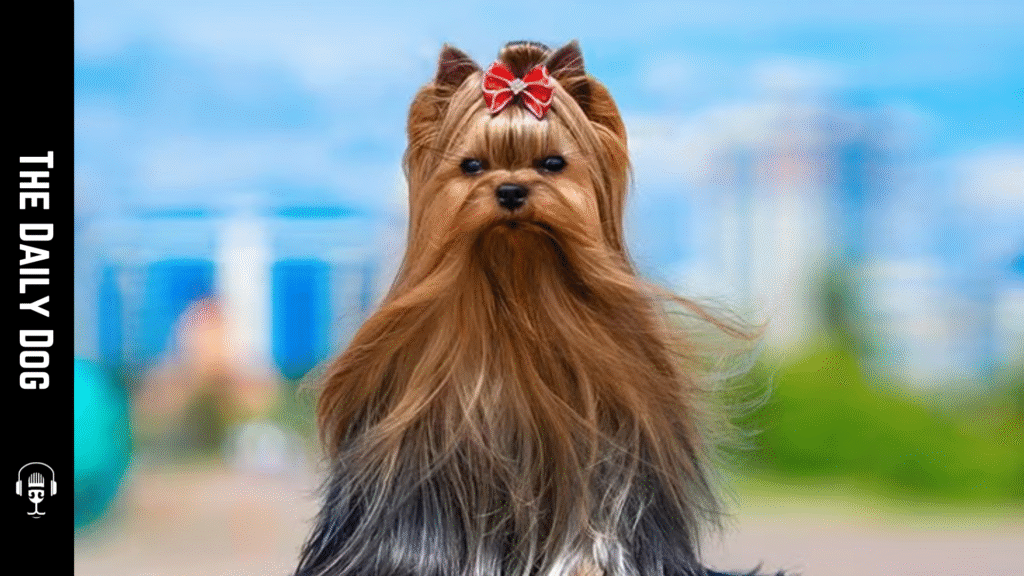The Yorkshire Terrier, often affectionately called the Yorkie, is one of the most beloved lap dogs in the world. With its silky coat, bright eyes, and spirited personality, this breed has carved out a unique niche in households ranging from bustling city apartments to serene countryside homes. Despite its tiny frame, the Yorkie carries a bold, confident demeanor that endears it to families seeking a loyal companion with plenty of personality. This article explores the Yorkie’s origins, temperament, care needs, training considerations, health, and why this pint-sized canine continues to capture hearts across generations.
Origins and Breed Identity
The Yorkshire Terrier’s story begins in 19th-century England, where it emerged from a mix of territorial terriers bred to control vermin and smaller breeds adapted for companionship. Initially developed to accompany miners and working-class families, Yorkies soon transitioned into favored pets of fashion-conscious households. Their compact size made them ideal for life in tight living spaces, while their fearless nature set them apart from larger dogs. Over time, the breed standardized into a distinct type characterized by a luxurious, straight coat and a bright, intelligent expression. Today’s Yorkies maintain that balance of elegance and pluck, offering a dash of glamour without sacrificing loyalty or resilience.
Appearance and Grooming Needs
Yorkshire Terriers are famously small, typically weighing between 4 and 7 pounds with a height of about 7 to 9 inches at the shoulder. The breed’s hallmark is a long, straight, fine coat that can shimmer in steel blue and tan hues when properly groomed. This striking appearance requires a regular grooming routine to prevent matting and maintain coat health. Many owners opt for a daily brushing session and schedule professional grooming every 4 to 6 weeks. Bathing is usually done every few weeks, depending on activity level and coat condition. Beyond aesthetics, regular grooming supports skin health and helps monitor for skin irritations or parasites. Crucial grooming tasks include trimming around the eyes and ears, cleaning the ears to prevent infections, and dental care, as Yorkies are prone to dental issues if teeth are neglected.
Temperament and Social Life
The Yorkie’s temperament blends courage, curiosity, and affectionate loyalty. They are known for their bold presence—often described as having “big dog” energy packed into a tiny frame. This personality trait makes them excellent watchdogs, as they are quick to alert their human companions to unusual sounds or movements. Yet at home, they are everything but aloof. Yorkies form strong bonds with their families and thrive on interaction, play, and positive reinforcement. They typically do well with children and other pets when socialized from a young age, though supervision is important with very small children due to their delicate size. A Yorkie’s social calendar should balance playtime, mental stimulation, and quiet downtime to prevent overexcitement or anxiety.
Training and Exercise
Yorkshire Terriers respond best to positive reinforcement training methods. They are intelligent, sometimes stubborn, and can exhibit a strong-willed streak if not engaged with appropriate motivation. Consistent, reward-based training that uses treats, praise, and play yields the best results. Short, frequent training sessions work well for this breed’s attention span. Early socialization is essential to help them navigate unfamiliar environments, people, and animals confidently. When it comes to exercise, Yorkies do not require extensive physical activity, but they do benefit from daily walks and interactive play. Mental engagement is equally important; puzzle toys, scent games, and gentle training routines can keep them mentally satisfied and less likely to develop behavioral problems stemming from boredom.
Health Considerations and Wellness
Yorkshire Terriers are generally healthy, but like all breeds, they are predisposed to certain conditions. Prospective and current owners should be aware of common concerns and work with a veterinarian to maintain optimal health. Notable issues include dental problems, which are prevalent in small breeds due to crowded teeth, and patellar luxation, a knee condition that can affect mobility. Some Yorkies may experience reverse sneezing or tracheal sensitivity, particularly if they are exposed to irritants or excitement. Regular veterinary checkups, a balanced diet, and appropriate dental care contribute significantly to longevity and quality of life. Responsible breeding practices, including health screenings for the parents, help reduce the risk of hereditary conditions and improve overall breed health.
Nutrition and Weight Management
Maintaining an appropriate weight is essential for a Yorkie’s joint health, heart health, and energy levels. Portion control and a high-quality diet tailored to small breeds support steady weight management. Owners should monitor treats, inches of coat growth, and activity level to ensure the dog remains at a healthy size. Some Yorkies develop sensitive stomachs, so a consistent feeding routine and gradual transitions when changing foods are advisable. Fresh water should always be available, and any sudden changes in appetite, weight, or digestion warrant a consultation with a veterinarian.
Grooming as an Expression of Care
For many Yorkie guardians, grooming is more than a routine, it’s a daily ritual that reinforces the bond between dog and owner. The Yorkie’s coat, when properly cared for, becomes a flowing reminder of the breed’s elegance. Regular brushing prevents tangling and reduces shedding around the home, while careful ear and eye cleaning helps prevent common issues. Grooming also provides an opportunity to perform gentle massaging touches that promote circulation and relaxation. The ritual of maintaining a Yorkie’s coat can be a quiet, bonding practice that supports both physical well-being and emotional connection.
Lifestyle Compatibility and Housing
Yorkshire Terriers adapt well to a variety of living environments, provided their needs are met. They are particularly suited to apartment living due to their modest exercise requirements and manageable size. However, given their protective temperament, they enjoy having a secure, comfortable space where they can retreat to a cozy bed or crate when needed. Socialization and consistent training are essential, especially in dense urban areas where foot traffic and strangers are more common. The Yorkie’s adaptability makes them a popular choice for first-time dog owners, families with older children, and individuals seeking a companion that can travel with them on routine outings and adventures.
Choosing a Yorkshire Terrier: What to Look For
Potential Yorkie owners should seek a reputable breeder or rescue group that prioritizes health testing, temperament, and responsible breeding practices. When evaluating a puppy or rescue candidate, consider factors such as the dog’s activity level, sociability, and how well their temperament aligns with your lifestyle. For breeders, evidence of health screenings for hereditary conditions and clear lines of lineage helps ensure a strong start for the puppy’s life. Rescue dogs often arrive with established personalities and training histories; a thorough assessment, including behavior observation and veterinary records, supports a smooth transition into a new home.
The Yorkie’s Enduring Allure
The Yorkie’s enduring appeal stems from its distinctive blend of elegance, spunk, and devotion. This small dog carries a fearless spirit that shines through in daily interactions, play, and companionship. A well-cared-for Yorkie offers steadfast devotion, a playful presence, and a sense of companionship that can brighten even the most routine days. Whether curled up at the foot of the bed or accompanying a family on urban excursions, the Yorkie’s presence is a reminder that size does not define the depth of a dog’s heart.
Careful consideration and ongoing education are essential for anyone considering this breed. By understanding the Yorkshire Terrier’s needs, from grooming and nutrition to training and health, owners can nurture a bond that lasts for years. With proper socialization, consistent care, and a patient, loving approach, the Yorkie becomes not just a pet, but a cherished member of the family.
Practical Tips for Yorkie Owners
- Establish a daily routine: predictable feeding, exercise, and grooming times help reduce anxiety and support behavior.
- Prioritize dental care: small breeds are prone to dental issues; regular tooth brushing and professional cleanings are valuable investments.
- Invest in quality gear: a comfortable collar, a reliable harness, and a studious approach to coat maintenance make daily life smoother.
- Socialize early and often: controlled exposure to new people, pets, and environments builds confidence and reduces fear-based behaviors.
- Schedule regular vet visits: preventive care, vaccinations, and early screening for common conditions extend well-being.
Conclusion
The Yorkshire Terrier remains a symbol of refined charm and spirited companionship. Its combination of elegance, courage, and devotion makes it a versatile and beloved choice for diverse living arrangements and lifestyles. By embracing attentive care, focused on grooming, training, nutrition, and health, Yorkshire Terriers can flourish as cherished family members for many years. This breed’s timeless appeal lies not only in its luxurious coat or petite silhouette but in the warmth and loyalty it brings into the home, turning everyday moments into memories that endure.
We offer a FREE Strategy Call.
Click on the graphic to learn more
Read More


Is the Ferry to Alaska Dog-Friendly? A Complete Guide for Traveling with Pets








